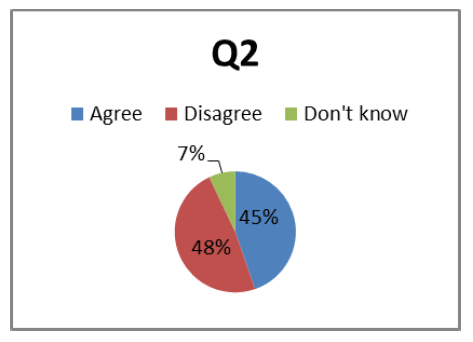Publication - Consultation analysis
The Protection of Vulnerable Groups (Scotland) Act 2007: Section 35(2) and (3) The Protection of Vulnerable Groups (Scotland) Act 2007 (Removal of Barred Individuals from Regulated Work) Regulations 2010
Report analysing the responses to our consultation on whether new regulations should be made under section 35(2) and (3) of the Protection of Vulnerable Groups (Scotland) Act 2007, 'the 2007 Act'.
Question 2: Do you agree that there is a need for new prohibitions and requirements on organisations employing barred individuals?
Analysis

- 41 of the 85 respondents disagreed that there is a need for new provisions. 38 felt there was a need for new provisions.
- The majority of those respondents not in favour of new prohibitions felt that the current approach was sufficient, ensured safety and was simple to understand and implement.
- YouthLink Scotland stated that "We disagree with the responsibility sitting with the organisation, without the involvement of Disclosure Scotland. This move would mean that organisations would be compelled to engage with Disclosure Scotland to ensure that an offence was not committed. We do not want these measures to be a 'back-door' way of making membership of the PVG Scheme mandatory from the perspective of organisations. We would prefer that organisations are supported to understand the benefits of engaging with Disclosure Scotland to maintain confidence in the process and services provided."
- A number of respondents also believe that the introduction of new provisions will result in an increased burden, financially and administratively for organisations.
- The general themes from the 38 respondents that agreed that new provisions are needed are that it will close a potential loophole allowing employers to continue to employ a barred individual working with vulnerable people and ensure the safe‑guarding intentions of the Act are met. New provisions will reduce the risk of harm further.
- Association for Change stated that if PVG was mandatory it would remove the need for any new provisions whilst benefitting employers and organisations. Young Foundations Ltd was in agreement that the PVG Scheme should be mandatory. Two further respondents, who wish to remain anonymous, called for the PVG Scheme to be made mandatory.
- Carli's Kindergarten stated the provisions should be changed to incorporate mandatory renewals of existing PVG members every three years. This is in line with SSSC guidance. A few respondents both for and against new provisions have suggested similar.
- The Society of Personnel and Development Scotland agrees that new provisions would give "more weight" for employers to check prospective employees, however, they have concerns how this will be enforced in practice.
Contact
- David Robertson, David.Robertson@disclosurescotland.gsi.gov.uk
There is a problem
Thanks for your feedback